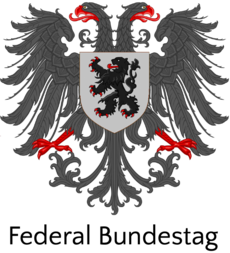Bundestag of the Rhinelandes
The Bundestag of the Rhinelandes is one of the two chambers that make up the Imperial Parliament. Commonly referred to as the Bundestag, it is the lower house of the Imperial Parliament. The Upper House of the Imperial Parliament, it's counterpart, is the Senate.
The Bundestag is made up of 500 representatives, each representing a specific constituency, who are elected every 5 years in first past the post voting systems. Elections to the Bundestag are termed 'federal elections' or 'general elections'.By law, a single term of the Bundestag cannot last more than 5 years but there is no minimum duration. As such, elections typically occur every 5 years and are called when the Chancellor requests the Emperor dissolve the Bundestag and call for a new election. The Chancellor can request the Emperor to call for an early election at any point in the term but no election may occur until 3 months have passed since the previous election. The last early election was called in 2010 after the SDP, Labour and Liberal Coalition government formed after the 2009 election collapsed.
The Bundestag's role in creating legislation has chaanged since confederation in 1759. Before the implementation of the Imperial Constitution in 1859, the Senate, not the Bundestag, created legislation and was the primary house in the Imperial Parliament. Chancellors and Cabinet Ministers were appointed from the Senate rather than the Bundestag. However, over time, with more regular elections and democracy becoming more popular, the Bundestag became the pre-eminent House in the Parliament. By 1825, the Bundestag would be the chamber to create legislation and form governments.
However, under the Imperial Constitution that was enacted in 1859, whilst the Chancellor and legislation originates from the Bundestag, the Senate still reserves the right to reject legislation produced by the Bundestag completely. The government is also not solely responsible to the Bundestsag and so the Chancellor stays in office only as long as he or she retains the confidence of a majority of both the Bundestag and the Senate.
Federal Elections since 1997
| 2015 Federal Election | 2010 Federal Election |
|---|---|
| Government: Conservative + Democratic | Government: Conservative + Democraatic |
Conservative Party: 185 seats Democratic Party: 69 seats Rhineland National Party: 6 seats Liberal Party: 49 seats Social Democratic Party: 153 seats Green Party: 23 seats Labour Party: 10 seats Independents: 5 seats |
Conservative Party: 178 seats Democratic Party: 67 seats Rhineland National Party: 15 seats Liberal Party: 48 seats Social Democratic Party: 146 seats Green Party: 18 seats Labour Party: 18 seats Independents: 10 seats
|
| 2009 Federal Election | 2007 Federal Election |
|---|---|
| Government: SDP, Labour + Liberal | Government: SDP + Labour |
Conservative Party: 158 seats Democratic Party: 42 seats Rhineland National Party: 20 seats Liberal Party: 66 seats Social Democratic Party: 162 seats Green Party: 24 seats Labour Party: 12 seats Independents: 16 seats |
Conservative Party: 120 seats Democratic Party: 42 seats Rhineland National Party: 6 seats Liberal Party: 49 seats Social Democratic Party: 227 seats Labour Party: 37 seats Green Party: 8 seats Independents: 11 seats
|
| 2002 Federal Election | 1997 Federal Election |
|---|---|
| Government: SDP + Labour | Government: SDP + Labour |
Conservative Party: 112 seats Democratic Party: 36 seats Rhineland National Party: 3 seats Liberal Party: 55 seats Social Democratic Party: 238 seats Labour Party: 40 seats Green Party: 8 seats Independents: 8 seats |
Conservative Party: 105 seats Democratic Party: 30 seats Rhineland National Party: 2 seats Liberal Party: 48 seats Social Democratic Party: 248 seats Labour Party: 49 seats Green Party: 6 seats Independents: 12 seats
|







